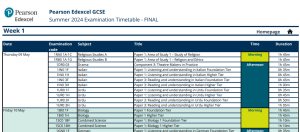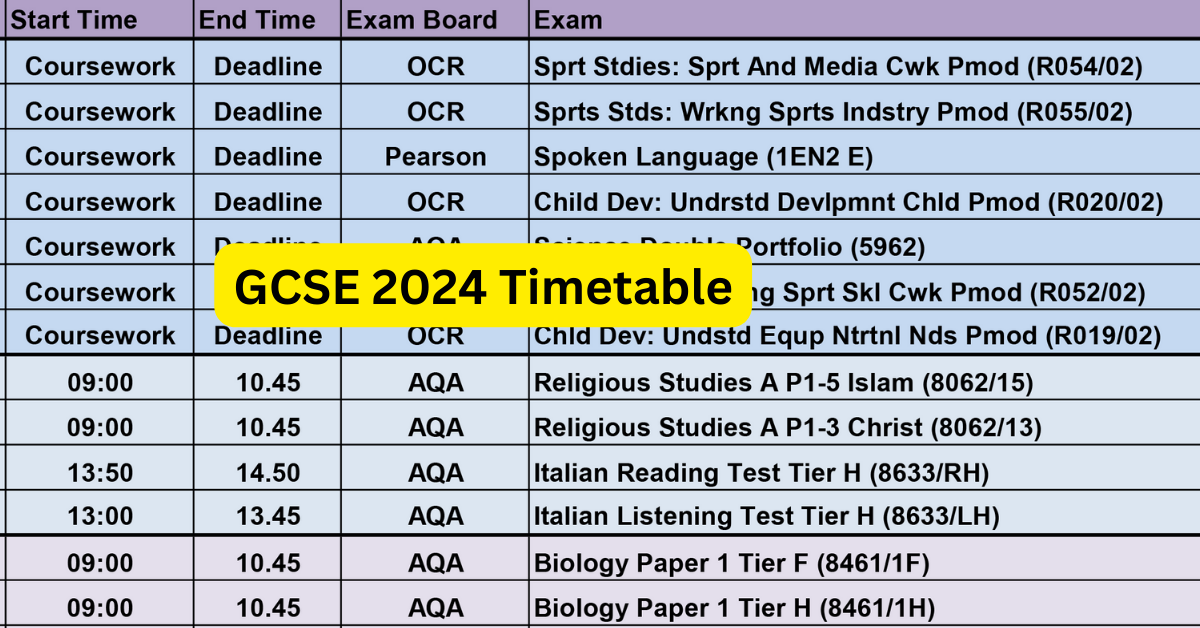Stay updated with the latest GCSE 2024 timetable release and find out everything you need to know to plan and prepare for your upcoming exams. Get ahead of the game and ace your exams with our helpful tips and resources.
GCSE exams are timetabled in common slots agreed upon by all exam boards under the Joint Council for Qualifications (JCQ). Each exam must be taken on the day, date, and time shown on the timetable. Students taking multiple exams in a session should take them consecutively, with a supervised break at the discretion of the school or college. Schools and colleges may start or delay exams up to 30 minutes before the published starting time without notifying AQA.
For other timetable variations, refer to the JCQ Instructions for conducting examinations or contact Customer Services. For examinations lasting less than one hour, candidates must be supervised, and question papers must be kept in the center’s secure storage facility until the published finishing time.
Schools and colleges must arrange practical and oral units according to the procedures on the relevant subject page of the website. Candidates must find an AQA-approved school or college responsible for all aspects of qualification delivery, including supervising, authenticating, standardizing, and marking all non-exam assessment (NEA) work.
Subject: qualification
Schools and colleges are required to submit internally assessed marks and assessments to AQA and their designated moderator by the specified dates. Submission dates include May 7, 2024, for all units and components; May 15, 2024, for ELC qualifications, FCSE, and projects; and May 31, 2024, for GCSE Art and Design.
Students entering for the May/June 2024 exams may carry forward the course component mark from a previous series, but it must be entered into the center mark submission software using the special status of carry forward. For GCSE History (8145), students must take one of the section A options plus one of the section B options, with the overall duration of Paper 1 being 2 hours. For Paper 2, students must take one of the section A options plus one of the section B options, with the overall duration of Paper 2 being 1 hour 45 minutes.
GCSE Grades: An Overview
GCSE (General Certificate of Secondary Education) grades play a crucial role in the educational journey of students, reflecting their performance in various subjects. Here’s a brief overview:
- Grading System: GCSEs in England, Wales, and Northern Ireland traditionally use a letter grading system, ranging from A* to G. However, since 2017, the grading system has shifted to a numerical scale from 9 to 1, with 9 being the highest grade.
- Numerical Grading: The numerical system introduced more granularity in distinguishing between students’ performances. Grade 9 represents the highest level of achievement, while Grade 1 indicates a lower level of attainment.
- Equivalent Grades: Though the grading system has changed, there are rough equivalences to the old letter grades. For example, a grade 7 is equivalent to an A, and a grade 4 is considered a standard pass, equivalent to a grade C.
- Entry-Level Qualifications: Some students may have entry-level qualifications in specific subjects. These qualifications are not graded on the 9-1 scale but have their assessment criteria.
- Subject-Specific Grading: Different subjects may have different grading criteria and components. For example, in English language and English literature, students are often assessed on both written exams and coursework.
- Assessment Methods: GCSE assessments may include written exams, coursework, practical assessments, and oral examinations. The weighting of each component varies across subjects.
- Impact on Further Education: GCSE grades are crucial for determining a student’s eligibility for further education, including A-levels, vocational courses, or apprenticeships. Many institutions and employers consider GCSE grades during the selection process.
- Resist Opportunities: Students who do not achieve their desired grades in the first attempt often have the option to resist exams in subsequent sessions. However, the approach to residents may vary, and it’s essential to check the policies of individual examination boards.
- Access to Higher Education: GCSE grades, particularly in core subjects like English and mathematics, may influence a student’s access to higher education. Some universities and courses have specific GCSE grade requirements for admission.
- Continuous Review: The education system periodically reviews and updates the GCSE grading system to ensure it aligns with evolving educational standards and meets the needs of students and institutions.
Pearson Edexcel 2024 GCSE Timetable

Examination.
• When a change is made to the published starting time for an
Examination it is the responsibility of the center to inform all candidates
Affected by the alteration.
• International centers must refer to the relevant document setting out
Examination start times for their time zone are available at
https://qualifications.pearson.com/en/support/supporttopics/exams/exam-timetables/international-start-times.html
